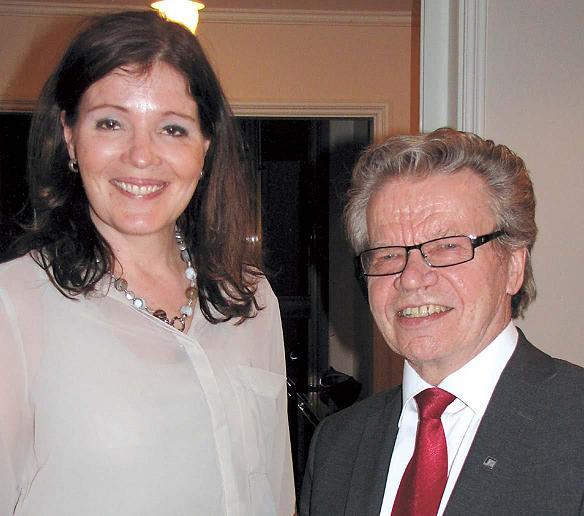Finland seeks secrets of Korea’s education success
By Korea HeraldPublished : June 10, 2012 - 19:08
Finland and Korea are both lauded for producing some of the world’s highest-performing students, but their education systems produce results by very different means.
Korean kids endure long school days followed by hours of evening classes, causing the Korean government to ban tutoring after 10 p.m. Meanwhile, Finnish children have the third-shortest schooldays in the OECD and don’t start compulsory schooling until 7 years old.
“We think that children need time for play,” explained former Finnish Education Minister Sari Sarkomaa, who visited Korea as part of a 10-person delegation last month. “They need to be children. They won’t learn so much when they work all the time.”
Korean kids endure long school days followed by hours of evening classes, causing the Korean government to ban tutoring after 10 p.m. Meanwhile, Finnish children have the third-shortest schooldays in the OECD and don’t start compulsory schooling until 7 years old.
“We think that children need time for play,” explained former Finnish Education Minister Sari Sarkomaa, who visited Korea as part of a 10-person delegation last month. “They need to be children. They won’t learn so much when they work all the time.”

While world leaders including American President Barack Obama have praised Korea’s hard-working students, Sarkomaa remained cautious about too much study at a young age.
“If I had to mention one thing in the Korean education system (it is that) if children have too long working days, they are exhausted. Then we don’t get the best results if they don’t have time to learn and sleep and eat well. If they can spend some time with their parents and their friends we can get better results in school too.”
However, she said that Korea should also be proud of its education success, explaining that the Finnish Education and Culture Ministry subcommittee dealing with funding was in Seoul to discover the secrets of Korean students’ high performance in international tests.
Both Finland and Korea consistently do well in the OECD’s Program for International Student of Assessment. The last PISA test, rating the abilities of 15-year-olds across 70 countries, ranked them highest for reading literacy. They were also recognized for providing high-quality education to all students, with children tending to perform well regardless of their social-economic background or the school that they attended.
“We are here because we wanted to know and learn more about Korea’s education system,” Sarkomaa told The Korea Herald while in Seoul. “Korea has very good scores in PISA so we want to know what is the secret of this success.”
She praised Korea’s advanced use of technology in education, such as the plan to have paperless schools by 2015. She said that Finland would like to follow Korea’s plan to give every school student a tablet computer.
“We are lagging behind in ICT in our schools and this subcommittee is responsible for the money behind this research.”
However, Finland is proud of its education success built upon highly trained teachers and a focus on student welfare. Finnish MP Raija Vahasalo, who also joined the delegation, said that a long tradition of offering universal free school meals was central to nurturing Finnish students.
This social welfare issue became a hot topic in Korea last August, with a referendum proposing to provide only Seoul’s poorest students with free lunches prompting political controversy, but ultimately failing.
“In Finland, they realized that food was necessary to have good results. The kids can’t learn on an empty stomach,” Vahasalo said. “We are very proud of that and we want to continue it even though we don’t have poor people any longer. That’s very important for kids to learn also, everyone knows that our women go to work very eagerly so there is no one at home to cook for the kids in the middle of the day.”
She said that employing highly qualified teachers was important.
“When you are a teacher of pupils over the age of 7 you must have a master’s degree. That is very important because it is important to know what happens when pupils try to learn from a scientific point of view. That is how we can develop ourselves as teachers. That is how you can choose your own pedagogical materials.
“We can choose the best part of our population because everyone wants to become a teacher, although the salary is not so good. We appreciate our teachers.”
And Head of the Finnish delegation Kauko Tuupainen said although Finland had done very well in PISA tests, he still wanted to get tips from Korea. “We wanted to know what we have in common and in particular if there are things that are taken care of better than we can in Finland.”
Sarkomaa agreed, saying it was important for her country not to rest on its success.
“I was surprised that so many people have said ‘Why are you here? You have an excellent education system.’ But as the world is changing so rapidly we have to follow what is happening and make amendments. If you don’t do that you lose the quality.”
By Kirsty Taylor (kirstyt@heraldcorp.com)
-
Articles by Korea Herald








![[Today’s K-pop] BTS pop-up event to come to Seoul](http://res.heraldm.com/phpwas/restmb_idxmake.php?idx=644&simg=/content/image/2024/04/17/20240417050734_0.jpg&u=)
![[Graphic News] More Koreans say they plan long-distance trips this year](http://res.heraldm.com/phpwas/restmb_idxmake.php?idx=644&simg=/content/image/2024/04/17/20240417050828_0.gif&u=)







![[KH Explains] Hyundai's full hybrid edge to pay off amid slow transition to pure EVs](http://res.heraldm.com/phpwas/restmb_idxmake.php?idx=652&simg=/content/image/2024/04/18/20240418050645_0.jpg&u=20240419100350)

